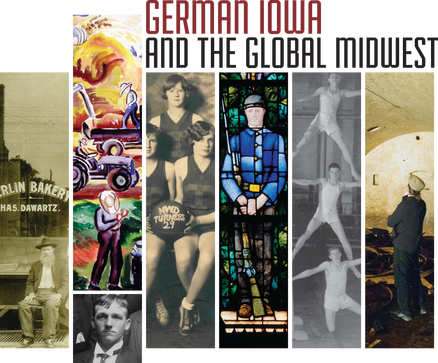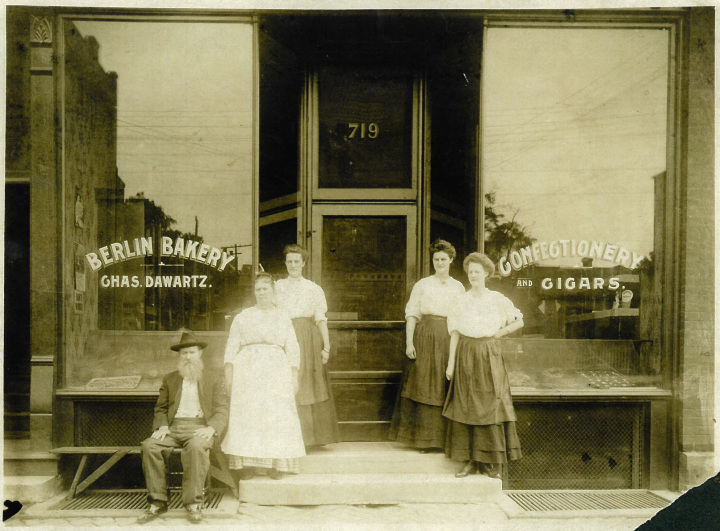The purpose of the Obermann Humanities Symposium is to explore an important humanities topic that highlights UI scholars and current scholarship. Often interdisciplinary, the Symposium can include public events, lectures, and related courses.
German Iowa and the Global Midwest

German Iowa and the Global Midwest was a three-day symposium (Oct. 6-8, 2016) that explored Iowa’s multicultural heritage. Organized by Elizabeth Heineman (History, CLAS), Glenn Ehrstine (German, CLAS), and H. Glenn Penny (History, CLAS), the 2016–17 Obermann Humanities Symposium was the catalyst for a series of yearlong events that included two exhibitions, one at Old Capitol Museum and another in the UI’s Mobile Museum; Doing Global History Locally: an International Programs Conference; and Town to Town, a workshop sponsored by Humanities Iowa to assist Iowa communities in hosting and contributing to the traveling exhibit. Visit the lively conference website.
“Working on this project with the Obermann Center fundamentally changed the way I teach. Whereas my European history classes used to focus overwhelmingly on secondary material and center on the continent of Europe, my courses today send students into local archives looking for global history.”
—H. Glenn Penny, co-director
Highlights
- Frank Trommler, an Ida Beam speaker, gave two public talks. The first, in the public library (ICPL), required extra chairs (80–90). The second, in the Senate Chamber of the Old Capitol, also was well attended (60–70). The latter event was introduced by Provost Barry Butler, who offered an introduction to the German Consul General Herbert Quelle.
- Among the many well-attended and thoughtful panels, the student panel stood out. Undergraduates gave papers that one member of the audience remarked were every bit as good as those one would expect at a national conference. The students who presented had the opportunity to do so alongside people whose work they had been reading for years. There is no question that students who attended these events benefited greatly. They have been inspired to pursue their own research projects and will no doubt seek out similar events in the future.
- The symposium included two musical events in partnership with the School of Music. The quality of the performances, combined with Glenn Ehrstine’s research and discussion of German music in Iowa around the turn of the century, made the Sängerfest performance especially lively. Again, undergraduate and graduate students who attended this and the subsequent performance came away with a completely different vision of life in Iowa 100 years ago—German or otherwise. During both performances, the auditoriums were filled, with many standing and sitting in the aisles.
- The final day’s panels did not lose any momentum. In fact, the last panel on German Jews in Iowa brought in large numbers of people from the community (75–80).

“Unlike most professional conferences I attend, the Obermann Humanities Symposium gave me the opportunity to engage the broader public while discussing Iowa’s German-American past with international experts. My personal highlights of the event: welcoming the German Consul General from Chicago and seeing over 250 lovers of choral music turn out for a concert from the Davenport Sängerfest of 1898. Best of all, the Obermann Center staff were there to guide us along the way and ensure the event reached its full potential.”
—Glenn Ehrstine, co-director
Other Successes and Outcomes
- Glenn Penny and Glenn Ehrstine incorporated the program as well as the museum exhibit into their classes with great success. Some 50 students wrote short papers on the presentations for Penny’s classes. Discussions in those classes have continued to return to these presentations all semester.
- One undergraduate, William Simpson, had an article, “A Rookie’s Guide to Archival Research,” regarding his work on the Scattergood Hostel in West Branch, IA, published on the United States Holocaust Memorial Museum’s website. Simpson was also featured in Iowa Now.
- Two special journal issues were being planned immediately following the symposium: an issue of Jewish Studies Journal and and issue of a migration history journal.
- A conference report written by graduate students was published on H-Net, while a reflection on the German Iowa and the Global Midwest project is being negotiated with German Studies Review.
- The co-directors are in conversation with a group of Germans who attended from the University of Münster to develop an exchange program, a means to bring their students to Iowa to work with local materials and communities.
-
The Max Kade Institute for German-American Studies at UW–Madison is interested in hosting the German Iowa and the Global Midwest exhibit in 2018.
“It was thrilling to work on a project that integrated public engagement, hands-on student experience, and cutting-edge scholarship so seamlessly. Bringing symposium participants to the museum exhibit, which had built on student research—and which is now touring the state—sparked a lot of discussion about the Obermann Center and UI as a model for this kind of work!”
—Elizabeth Heineman, co-director
Speakers, Panelists, and Moderators
- Frank Trommler, Professor Emeritus of German at the University of Pennsylvania
- Kirsten “Kit” Belgum, Associate Professor of German at the University of Texas at Austin
- Tobias Brinkmann, Malvin and Lea Bank Associate Professor of Jewish Studies and History at the Pennsylvania State University
- Heike Bungert, Professor of American Studies at the University of Münster
- Kathleen Neils Conzen, Thomas E. Donnelley Professor Emerita of American History at The University of Chicago
- Alison Efford, Associate Professor of History at Marquette University
- Jeannette Gabriel, PhD candidate in the University of Iowa Department of Teaching and Learning, College of Education, and curator of the Jewish Women in Iowa Project
- Walter D. Kamphoefner, Professor of History at Texas A&M University
- Kelsey Kramer McGinnis, PhD candidate in Musicology, CLAS, at the University of Iowa, and a staff member at the University of Iowa Center for Human Rights
- Bradley Naranch, Assistant Professor of History at the University of Montana
- Jana Weiß, Assistant Professor of History at the University of Münster
- Bethany Wiggin, Associate Professor of Germanic Languages and Literatures at the University of Pennsylvania
- Andrew Zimmerman, Professor of History at George Washington University
